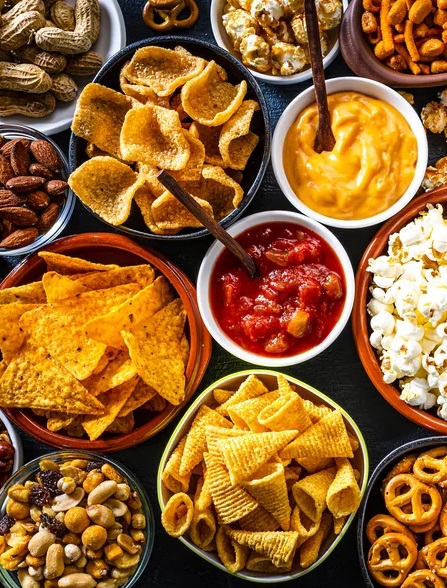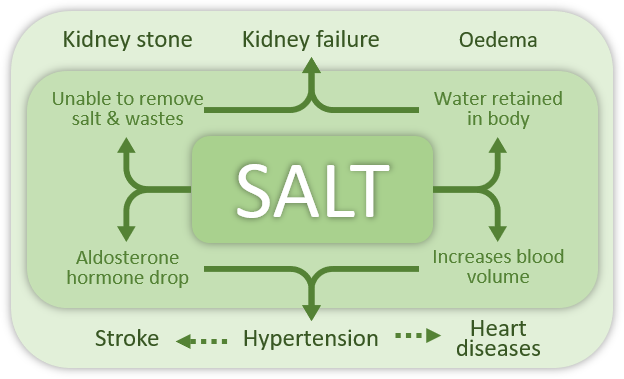Page Contents
For centuries, people use salt as a common seasoning to enhance flavours, cure meats, baking and preservation.
Apart from the salt crystal you add to your cooking, there is another major source which is the sodium content in all the processed, preserved, and fast foods. The sodium usually comes in the form of sodium chloride, monosodium glutamate (MSG), sodium bicarbonate, sodium benzoate, and sodium nitrate.

Examples of foods that are high in salt / sodium
- Pizza
- Burgers
- Pasta
- Burritos and tacos
- Sandwiches
- Fried foods
- French fries
- Sausages, Chinese sausages
- Ham and bacon
- Salted fish
- Salted egg
- Pickles
- Luncheon meat
- Beef jerky
- Smoked salmon
- Cheese
- Savoury snacks
- Breads, bagels, cookies and muffins
- Sauces, ketchup, salad dressing
- Meat patty
- Instant noodles
- Potato chips
- Peanut butter

Implication of high-salt diet
Kidney diseases
The primary implication of excessive salt intake is kidney problems. Kidneys’ function is to regulate the homeostasis of fluid and minerals by excreting waste products, excess mineral ions and excess water from the body. Once kidneys lose the ability to flush out extra salt, and wastes, it will cause the accumulation of salt in the kidneys. Over time, it can develop into kidney stones.
Kidneys also produce aldosterone hormone to regulate blood pressure. Failing kidneys will eventually not producing the hormone leading to hypertension. Hypertension can narrow or harden the blood vessels, causing damage to kidney tissues by reducing the supply of oxygen and nutrients. With damages in the kidneys, they lose their ability to filter blood and regulate the fluid, hormones, acids and salts in your body.
Kidney failure is a lifetime condition whereby you will require the help of dialysis to filter your blood on a regular basis. More on dialysis will be discussed in the future.
Heart diseases and stroke
High content of salts in your system will pull water into bloodstream and increases the blood volume. With increased volume, your heart will need to pump harder to circulate the blood, which causes hypertension. Over time, it can cause damages to blood vessels, leading to heart diseases and stroke.
Oedema
When salt content is too high and water is retained in your body, it can lead to another condition known as fluid retention or oedema. Untreated oedema will lead to painful swelling, joint stiffness, difficulty in walking, stretched and itchy skin, skin ulcers and scarring, and decreased blood circulation.

How to reduce salt intake?
Knowing the health implications, it is important to reduce salt in your diet. There are several ways that you can start today!
- Consciously reduce salt while cooking
It is always better to add less salt than too much of it, because you will have a hard time reduce the saltiness. - Potassium chloride salt
These sodium-free salt substitutes can replace and cut down the amount of sodium in your diet, but it is not suitable for people with kidney diseases. - Lemon juice, zest and vinegar
Adding acidic ingredients instead of salt can bring out a food’s natural flavours. - Herbs and spices
Consider using herbs or spices like garlic, black pepper, onion, ginger, paprika, basil, coriander, mint, rosemary, etc. in cooking to enhance flavours. - Sea salt and rock salt
Sea salt and rock salt contain more flavourful minerals, and you can reduce the amount of salt to achieve preferred saltiness. - Eat fresh, cook fresh
Cooking meals with fresh ingredients instead of having preserved and processed food. - Replace chicken broth with chicken stock
Broth is high in sodium while stock isn’t, both are prepared differently. You can click here to read more. - Other products
Instead of adding salt to your cooking, you can use products like miso, low-sodium soy sauce, seaweeds (Kombu, Nori, Wakame).
What happens if you lack salt in diet?
Even now you realise too much salt is unhealthy, you cannot totally eliminate salt from your diet. Salt is essential for many important biological processes, your body needs salt for transmission of nerve impulses, fluid balancing to maintain normal blood pressure, contraction and relaxation of muscle fibres.
When your blood has very low salt concentration, your body will go into a dehydration stage called hyponatremia, you will experience symptoms such as muscle cramps, nausea, vomiting, dizziness, headaches and fatigue. In severe cases, it can lead to shock, coma and even death.
Hyponatremia happens not only when you stop consuming salt, it also happens when you drink too much water! Water dilutes the sodium in your body and can cause an imbalance of electrolytes, cell swelling, brain swelling, and increases burden to your kidneys.
If you are active in endurance and high-intensity activities, such as marathons and triathlons. It is essential to replenish water, electrolytes, and energy lost during exercise.
Conclusion
Apart from salt, I will post topics of oil and sugar in daily diet, which could lead to many severe chronic conditions such as heart diseases and diabetes.
